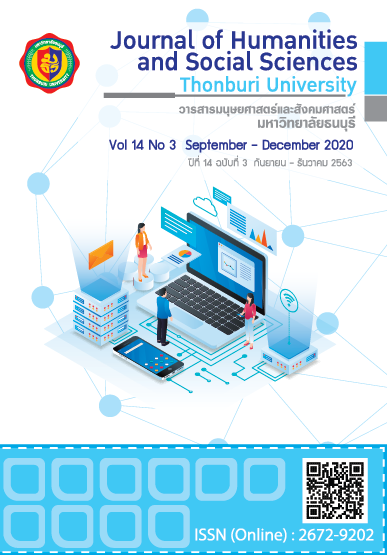A Development of Competencies and Indicators for Administrators of Private Vocational Education in Eastern Economic Corridor (EEC) area
Keywords:
Competencies and Indicators, Administrators of private vocational education, Private vocational education, Eastern Economic Corridor (EEC)Abstract
Abstract
The objectives of this research were 1) to develop competencies and indicators for administrators of private vocational education in Eastern Economic Corridor area, 2) to validate and confirm a development of competencies and indicators for administrators of private vocational education in Eastern Economic Corridor area. Administrators of private vocational education in the Eastern area were chosen as the sample of the study. The questionnaires were used as a research tool.
The research results were 1) the competencies and the indicators for the administrators of private vocational education in Eastern Economic Corridor area consisted of 4 competencies 15 indicators by determining the highest factor loading that are 1. the leadership competency 5 indicators, 2. the strategic thinking competency 4 indicators, 3. the communication competency 3 indicators and 4. the network competency 3 indicators, 2) validation and confirmation of competencies and indicators for administrators of private vocational education in Eastern Economic Corridor area model significantly correlated with the empirical data (CMIN/df=1.170, P-value=0.185, GFI=0.960, AGFI=0.910, RMR=0.003, RMSEA= 0.030).
Keywords: Competencies and Indicators, Administrators of private vocational education, Eastern Economic Corridor (EEC), Private vocational education
References
ณัฐพล บัวเปลี่ยนสี (2561). รูปแบบการพัฒนาบุคลากรในพื้นที่ระเบียงเศรษฐกิจพิเศษภาคตะวันออก เพื่อรองรับอุตสาหกรรมเป้าหมายในอนาคต. วารสารวิชาการสถาบันเทคโนโลยีแห่งสุวรรณภูมิ, 4(1): 303-315.
ณัฐสิฏ รักษ์เกียรติวงศ์. (2559). การปฏิรูปอาชีวศึกษาของประเทศไทย. สืบค้นเมื่อ 15 มีนาคม 2562, จาก http:// tdri.or.th/2016/08/vocational-education-reform
นฤนาท เพิ่มพงศ์พิสิฐ; และ จรัญญา ปานเจริญ. (2560). การสื่อสารการตลาดแบบบูรณาการที่มีผลต่อการตัดสินใจเลือกเรียนอาชีวศึกษาเอกชน ของนักเรียนประกาศนียบัตรวิชาชีพ (ปวช.) ชั้นปีที่ 1 วิทยาลัยเทคโนโลยีรัตนโกสินทร์. วารสารบัณฑิตศึกษา มหาวิทยาลัยธุรกิจบัณฑิตย์, 6(3): 211–217.
พระครูปฐมเจติยานุรักษ์; และ กฤษฎา นันทเพ็ชร (2559). สภาพการบริหารการศึกษาอาชีวศึกษา. วารสารครุศาสตร์ปริทรรศน์ฯ, 3(3): 47–61.
พัศนิยา โกยสกุล (2556). สมรรถนะของผู้บริหารที่ส่งผลต่อการดำเนินงานตามมาตรฐานโรงเรียนคุณภาพ สังกัดกรุงเทพมหานคร. วิทยานิพนธ์ปริญญาศึกษาศาสตรมหาบัณฑิต สาขาวิชาการบริหารการศึกษา บัณฑิตวิทยาลัย มหาวิทยาลัยศิลปากร.
ภาณินี แสงหิรัญ (2562). การพัฒนาสมรรถนะและตัวชี้วัดของผู้บริหารวิทยาลัยอาชีวศึกษาเอกชน ในเขตพื้นที่โครงการเขตพัฒนาเศรษฐกิจภาคตะวันออก. ศึกษาศาสตร์ดุษฎีบัณฑิต, มหาวิทยาลัยเซนต์จอห์น.
มาตา แก้วเซ่ง (2559). การพัฒนาตัวบ่งชี้การคิดเชิงกลยุทธ์ของผู้บริหารสถานศึกษาในกลุ่มจังหวัดภาคใต้ฝั่งอันดามัน สังกัดสำนักงานคณะกรรมการการศึกษาขั้นพื้นฐาน. ปริญญานิพนธ์ปริญญาการศึกษาดุษฎีบัณฑิต สาขาวิชาการบริหารและการจัดการการศึกษา บัณฑิตวิทยาลัย มหาวิทยาลัยศรีนครินทรวิโรฒ.
เมธาวี ภุมรินทร์. (2559). การพัฒนาสมรรถนะ และตัวชี้วัดประจำตำแหน่งของผู้บริหารสถานศึกษาเฉพาะความพิการ. ศึกษาศาสตร์ดุษฎีบัณฑิต, มหาวิทยาลัยเซนต์จอห์น.
เรืองแสง ห้าสกุล. (2559). แนวทางการเสริมสร้างสมรรถนะผู้บริหารสถานศึกษาอาชีวศึกษาในสถาบันการอาชีวศึกษาภาคกลาง 5. หลักสูตรพัฒนานักบริหารระดับสูง กระทรวงศึกษาธิการ สถาบันพัฒนาครู คณาจารย์ และบุคลากรทางการศึกษา สำนักงานปลัดกระทรวงศึกษาธิการ.
สำนักงานคณะกรรมการส่งเสริมการลงทุน. (2560). EEC ระเบียงเศรษฐกิจพิเศษ ภาคตะวันออก. วารสารส่งเสริมการลงทุน. 28(7): 8–11.
สำนักงานเลขาธิการสภาการศึกษา. (2561). สภาวะการศึกษาไทย ปี 2559/2560 แนวทางการปฏิรูปการศึกษาไทยเพื่อก้าวสู่ยุค Thailand 4.0. กรุงเทพฯ: สกศ.
Translated Thai References
Bhummarin, M. (2016). A Development of Job Competencies and The Indicators for The Special Education School Administrators. (Doctor of Philosophy, St. John’s University). (in Thai)
Buapriansee, N. (2018). Personnel Development Model in the Eastern Economic Corridor to Support Future Target Industries. Journal of Suvarnabhumi Institute of Technology Humanities and Social Sciences), 4(1): 303–315. (in Thai)
Hasakul, R. (2016). How to strengthen competencies of vocational education’s administrators in Institute of Vocational education: Central Region 5. (Ministry of Education’s Executive Development Program, National Institute for Development of Teachers, Faculty Staff and Educational Personnel, Office of the Permanent Secretary, Ministry of Education). (in Thai)
Kaewseng, M. (2016). A Development of Strategic Thinking Indicators of School Administrators in the Southern Provinces along the Andaman Coast, Office of Basic Education. (Doctor of Education, Educational Administration and Management, Srinakharinwirot University). (in Thai)
Koysakul, P. (2013). The Administrator’s Competency Affecting Performance based on Smart School Standard under the Bangkok Metropolitan Administration. (Master of Education, Educational Administration, Silpakorn University). (in Thai)
Office of the Education Council. (2018). Education in Thailand 2016/2017 Reform of Thai Education to Thailand 4.0. Bangkok: ONEC. (in Thai)
Permpongpisit, N. & Panchareon, J. (2017). Integrated Marketing Communication which affects in choosing to study private vocational college of students in vocational certification year 1 at Rattanakosin Technological College. Journal of Graduate School Dhurakij Pundit University, 6(3): 211–217. (in Thai)
Phra Kru Pathomjetiyanurak & Nantapetch, K. (2016). Administration Status of Vocational Education. Journal of Educational Review Faculty of Education in MCU, 3(3): 47 – 61. (in Thai)
Rakkiatwong, N. (2016). Reform of Vocational Education in Thailand. Retrieved March 15, 2019, from http:// tdri.or.th/2016/08/vocational-education-reform (in Thai)
Saenghiran, P. (2019). A Development of Competencies and the Indicators for Administrators of Private Vocational Education in Eastern Economic Corridor Area (EEC). (Doctor of Philosophy, St. John’s University). (in Thai)
The Board of Investment of Thailand. (2017). EEC Eastern Economic Corridor. Investment Promotion Journal. 28(7): 8–11. (in Thai)







